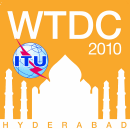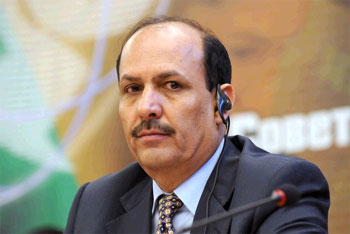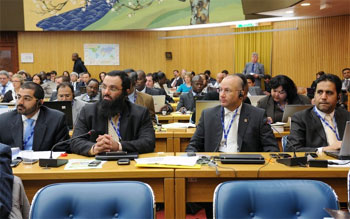|
Geneva, 19 April 2010 |
Not an official record |
N°4 |
|||
| Next » | |||||
|
World Telecommunication Development Conference 2010 Preparations are going well for the World Telecommunication Development Conference (WTDC-10), to be held in Hyderabad, India, from 24 May to 4 June 2010. Yury Grin, Deputy to the Director of ITU’s Telecommunication Development Bureau (BDT), presented Document C10/29 giving a brief overview of these preparations.  Following the successful completion of the six Regional Preparatory
Meetings (RPM), held in 2009 and early 2010, a Coordination Meeting was
organized on 22-23 February 2010 – just before the Telecommunication
Development Advisory Group. The RPM Coordination Meeting, which marks
the conclusion of the preparatory process for WTDC-10 was made up of the
chairmen and vice-chairmen of all six RPMs. The meeting, Mr Grin said,
achieved excellent results and unanimously agreed on the consolidation
of the RPM outcomes. The conclusion of the regional preparatory process
now provides a solid ground for members to put forward their proposals,
Mr Grin commented and went on to highlight the following points: Following the successful completion of the six Regional Preparatory
Meetings (RPM), held in 2009 and early 2010, a Coordination Meeting was
organized on 22-23 February 2010 – just before the Telecommunication
Development Advisory Group. The RPM Coordination Meeting, which marks
the conclusion of the preparatory process for WTDC-10 was made up of the
chairmen and vice-chairmen of all six RPMs. The meeting, Mr Grin said,
achieved excellent results and unanimously agreed on the consolidation
of the RPM outcomes. The conclusion of the regional preparatory process
now provides a solid ground for members to put forward their proposals,
Mr Grin commented and went on to highlight the following points:
 Commenting
on the report, Malaysia highlighted the need to put greater reliance on
regional preparatory meetings, and possibly emulate the current practice
in organizing inter-regional coordination meetings for World
Radiocommunication Conferences. No further comments were made on the
document and on WTDC-10 preparations, which were noted with much
appreciation. Commenting
on the report, Malaysia highlighted the need to put greater reliance on
regional preparatory meetings, and possibly emulate the current practice
in organizing inter-regional coordination meetings for World
Radiocommunication Conferences. No further comments were made on the
document and on WTDC-10 preparations, which were noted with much
appreciation.
Sami Al Basheer Al Morshid, Director of BDT, expressed his gratitude to the host country, India, for all their support and for making every effort to ensure that the conference will be a success. Changing the frequency of TELECOM events
But one thing is certain. The ICT industry still needs a “place to meet” – a “place” that enables it to engage on a regular basis. And this place must be ITU TELECOM. To this end, the document proposes a new format that would boost participation and a new frequency for WORLD events. “Industry feedback and comments have indicated to us that having an ITU TELECOM WORLD event as a regular, predictable feature on their calendar is important,” Mr Judja-Sato told the Council. He went on to propose a new frequency for ITU TELECOM events, with WORLD events to be held annually. These events would alternate as follows:
Mr Judja-Sato also proposed a revitalization of the ITU TELECOM brand to ensure its continued validity and relevance in today’s marketplace. He went on to highlight a number of measures which ITU TELECOM could take to continue engaging its community in the interval between events. He underlined that through this new direction, format and frequency of events, ITU TELECOM is confident that it will provide events that best serve the varied needs of ITU’s membership, whilst at the same time providing extra value and support for ITU itself. To enable ITU TELECOM to forge ahead with this vision, the Council was requested to examine Resolution 11 (Rev. Antalya 2006) contained in Annex 1 Document C10/66 and to propose amendments to PP-10. Comments from the floor Reflecting on the sharp drop in the number of visitors and exhibitors to ITU TELECOM events, a number of councillors commented that the economic crisis cannot be blamed for everything. For some, these events are no longer attractive, and ITU needs to investigate why, underlining that the Union cannot sustain loss, but must focus on gains. In this regard, many delegations supported the concept of reforming TELECOM events. The United States noted that there is still an appetite for industry leaders to come together to discuss. The idea of developing a model agreement for hosting TELECOM events was also supported. Such an agreement, the United Stated specified, would be prepared by the ITU secretariat, negotiated by the potential host country and then submitted to the Council for review and approval. Conclusion The Council noted the report on the activities contained in Document C10/26. As for Document C10/66, the comments made by councillors, especially those on strategies to improve ITU TELECOM, and the need for a model host country agreement will be taken into account and reflected in the summary record. A drafting group was set up under the chairmanship of Tanzania. It will meet on Tuesday evening (20 April) to review the proposed amendments to Resolution 11 (Rev. Antalya 2006) taking on board the specific comments made by the Council in this regard and report back to the Plenary. Schedule of conferences, assemblies and meetings of the Union for the period 2010-2012 Idrissa Samaké, Chief of ITU’s Conferences and Publications Department presented a planned schedule of future events to be organized by ITU in the period 2010-2012. The schedule (see Document C10/19 Rev.1) was presented for general information. It takes due account of the relevant resolutions of the Plenipotentiary Conference, in particular Resolution 77 (Rev. Antalya, 2006), as well as the principles contained in Resolution 111 (Rev. Antalya, 2006). Saudi Arabia pointed out that Islamic holidays should be taken into account when planning conferences and meetings. The delegation said that the dates between 17 and 26 October 2012 should be avoided, as they fall during the Hajj period for Muslims. Conclusion The Council noted the document with appreciation, and reminded the secretariat to avoid planning any events during religious holidays. Scheduling of Council sessions and Plenipotentiary Conferences  The United Arab Emirates (UAE) proposed that future Plenipotentiary
Conferences should be held in the last quarter of the year. It also
underlined that Council sessions should be held in the last quarter of
every year as instructed in resolves 2 of Resolution 153 (Antalya, 2006)
– except during a Plenipotentiary year. In the Plenipotentiary
year, the Council shall be held in the second quarter. UAE further
proposed that WTDC should be held preferably five to six months before a
Plenipotentiary Conference. The United Arab Emirates (UAE) proposed that future Plenipotentiary
Conferences should be held in the last quarter of the year. It also
underlined that Council sessions should be held in the last quarter of
every year as instructed in resolves 2 of Resolution 153 (Antalya, 2006)
– except during a Plenipotentiary year. In the Plenipotentiary
year, the Council shall be held in the second quarter. UAE further
proposed that WTDC should be held preferably five to six months before a
Plenipotentiary Conference.The UAE's proposals are based on Resolution 153 on “Scheduling of Council Sessions and Plenipotentiary Conferences”. This resolution says that:
Presenting its proposals to the Council (see Document C10/47), UAE noted that “after PP-06, the ITU Council sessions have been held in the last quarter of 2008 and 2009 respectively, which is very much in line with resolves 2 of Resolution 153”. However, in 2007 the Council session was held in September, and this year, the session is being held during April 2010. “This clearly shows the contradictions in implementing Resolution 153,” the UAE commented. There was unanimous support for the UAE’s proposal to hold Council sessions in the second quarter and Plenipotentiary Conferences in the last quarter. South Africa, supported by many other countries, underlined that a three-month window between PP and WTDC was inadequate for such important conferences. “A six‑month window would be much more appropriate as is proposed by UAE,” South Africa said. Developing countries need to have ample time to prepare for these events. The United States also favoured a six-month interval between a WTDC and a PP, noting that sometimes experience should be considered above theory. Conclusion The Council agreed to transmit the UAE’s proposals in Document C10/47 to PP10. Meanwhile, the Secretary-General proposed that the date for the transition of the newly elected team should be set as 1 January. This was supported by Bulgaria and Egypt, and will be noted in the summary record. Date and duration of Council 2011 The Council has the statutory responsibility to fix the dates of its own meetings. In line with established practice, the secretariat proposed dates for the 2011 session of the Council. Introducing Document C10/5, Marie-Odile Beau, Head of ITU’s Membership Division, said that the proposed dates are for a period of 9 working days (from 11 to 21 October 2011) instead of 8, as this will be the first Council session after PP-10, and will have on its agenda the adoption of the budget for 2012-2013. These dates were selected taking into account other meetings already planned in the fall of 2011, notably the celebration of the ITU TELECOM 40th Anniversary in October 2011. Conclusion Council noted Document C10/5. However, in view of the comments from several delegations, in particular the United States which proposed that Council sessions be organized in the second quarter of each year, between April and June, the Council decided that a final decision on the dates of the 2011 session would be taken at its Extraordinary Session. This session will be organized at the end of PP-10, and will take into account possible revision of Resolution 153 on scheduling of Council sessions and Plenipotentiary Conferences. |
|||||
